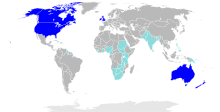
Back Англыз бызшәа Abkhazian Basa Inggréh ACE Инджылызыбзэ ADY Engels Afrikaans Englische Sprache ALS እንግሊዝኛ Amharic Ikiris a sowal AMI Idioma anglés AN Niwenglisc spræc ANG अंग्रेजी भाषा ANP
| Inglis | |
|---|---|
| English | |
| Region | Oreeginally Ingland nou warldwide |
Native speakers | 360–400 million (2006)[1] L2 speakers: 400 million; as a foreign leid: 600–700 million[1] |
Early forms | |
| Manually coded Inglis (multiple seestems) | |
| Offeecial status | |
Offeecial leid in |
|
| Leid codes | |
| ISO 639-1 | en |
| ISO 639-2 | eng |
| ISO 639-3 | eng |
| Glottolog | stan1293[2] |
| Linguasphere | 52-ABA |
 Kintras o the warld whaur Inglis is a majority native leid
Kintras whaur Inglis is offeecial but nae a majority native leid | |
Inglis (Inglis: English) is a Wast Germanic leid that arose in the Anglo-Saxon kinricks o England an spread intae whit wis tae become sooth-east Scotland unner the influence o the Anglian medieval kinrick o Northumbrie. Follaein the economic, poleetical, military, scienteefic, cultural, an colonial influence o Great Breetain an the Unitit Kinrick frae the 18t century, via the Breetish Empire, an o the Unitit States syne the mid-20t century,[3][4][5][6] it haes been widely dispersed aroond the warld, become the leadin leid o internaitional discourse, an haes acquired uise as lingua franca in mony regions.[7][8] It is widely learnit as a seicont leid an uised as an offeecial leid o the European Union an mony Commonwealth kintras, as well as in mony warld organisations. It is the third maist natively spoken leid in the warld, efter Mandarin Cheenese an Spaingie.[9]
Historically, Inglis originatit frae the fusion o leids an dialects, noo collectively kent as Auld Inglis, whilk wur brocht tae the eastren coast o Great Breetain bi Germanic (Anglo-Saxon) settlers beginnin in the 5t century – wi the wird "Inglis" bein derived frae the name o the Angles.[10] A significant nummer o Inglis wirds are constructit based on roots frae Latin, acause Latin in some form wis the lingua franca o the Christian Kirk an o European intellectual life.[11] The leid wis faur influenced bi the Auld Norse leid wi Viking invasions in the 8t an 9t centuries.
The Norman conquest o Ingland in the 11t century gae rise tae hivy borrowins frae Norman-French, an vocabulary an spelling conventions began tae gie the superficial appearance o a close relationship wi Romance leids[12][13] tae whit haed nou become Middle Inglis. The Great Vowel Shift that began in the sooth o Ingland in the 15t century is ane o the historical events markin the separation o Middle an Modern Inglis.
Awin tae the significant assimilation o various European leids throughoot historie, modren Inglis is aften seen as haein a gey muckle vocabulary. The Oxford Inglis Dictionary leets ower 250,000 distinct wirds, an daes nae include mony technical or slang terms, or wirds that belang tae multiple wird classes.[14][15]
- ↑ a b Crystal 2006, pp. 424–426.
- ↑ Nordhoff, Sebastian; Hammarström, Harald; Forkel, Robert; Haspelmath, Martin, eds. (2013). "Standard English". Glottolog. Leipzig: Max Planck Institute for Evolutionary Anthropology.
- ↑ Ammon, pp. 2245–2247.
- ↑ Schneider, p. 1.
- ↑ Mazrui, p. 21.
- ↑ Howatt, pp. 127–133.
- ↑ Crystal, pp. 87–89.
- ↑ Wardhaugh, p. 60.
- ↑ "Summary by language size". Ethnologue: Languages of the World. Retrieved 10 Februar 2015.
- ↑ "English — Definition from the Merriam-Webster Online Dictionary". Merriam-webster.com. 25 Apryle 2007. Retrieved 2 Januar 2010.
- ↑ "Old English language — Latin influence". Spiritus-temporis.com. Archived frae the original on 31 August 2011. Retrieved 2 Januar 2010.
- ↑ "Words on the brain: from 1 million years ago?". History of language. Retrieved 5 September 2010.
- ↑ Albert C. Baugh & Thomas Cable (1978). "Latin Influences on Old English". An excerpt from Foreign Influences on Old English. Archived frae the original on 27 November 2010. Retrieved 5 September 2010.
- ↑ "How many words are there in the English Language?". Oxforddictionaries.com. Archived frae the original on 30 November 2011.
- ↑ Vista Worldwide Lanugage Statistics